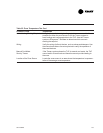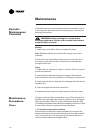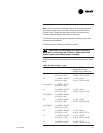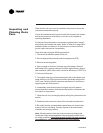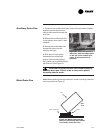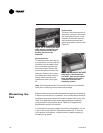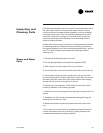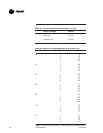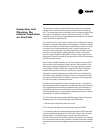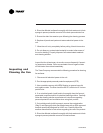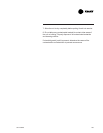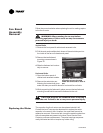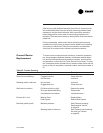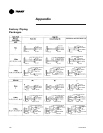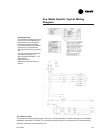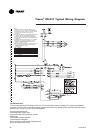
UNT-IOM-6 123
The process of cooling and dehumidification produces condensate
(water) which must be continuously removed from the air handling
unit. The entering air side of the cooling coil to the leaving edge of the
drain pan is considered to be the wet section of the unit. Other
potentially wet sections are immediately downstream of a humidifier
and/or an fresh air intake section.
It is common for the wet section components, including the internal
insulation, to become wet during normal operation. Therefore, inspect
the internal insulation in these areas periodically to assure it is clean
and free of dirt or microbial growth (mold). Inspect units every six
months or more frequently if operating experience dictates. Accumu-
lated dirt and other organic matter exposed to water or extended
periods of high relative humidity (60% or higher) may support micro-
bial growth. Clean the insulation to prevent the unit from becoming an
IAQ contaminant source.
Also, inspect internal insulation in the dry areas of the unit periodi-
cally to ensure the insulation is clean and dry. Wet insulation in an
area that is normally considered to be dry may indicate an opera-
tional problem. Refer to Table 40 on page 99 for further information.
Inspect the equipment a minimum of every six months or more
frequently if operating experience dictates. When accumulated dirt
and other organic matter is exposed to water or extended periods of
high relative humidity (60% or higher) may support microbial growth,
an indoor air quality contaminant source.
If evidence of contamination exists in either the wet or dry sections,
take immediate action to determine and eliminate the cause. Remove
the contamination and sanitize the affected area. See Tabale 40 on
page 99 for assistance in identifying the cause. Remove and clean
any microbial growth on a non-porous insulating surface (e.g. closed-
cell insulation or sheet metal surface).
The Trane Company recommends the following procedure for proper
cleaning the fan-coil internal insulation and sheet metal:
1. Disconnect all electrical power to the unit.
2. Don the appropriate personal protective equipment (PPE).
3. Thoroughly clean the contaminated area(s) with an EPA-approved
sanitizer specifically designed for HVAC use. Use a brush for sheet
metal surfaces or a soft sponge on closed-cell foam surface to
mechanically remove the microbial growth. Be careful not to damage
the non-porous surface of the insulation. Carefully follow the sanitizer
manufacturers instructions regarding personal protection and ventila-
tion.
Inspecting and
Cleaning the
Internal Insulation
on Fan-Coils



